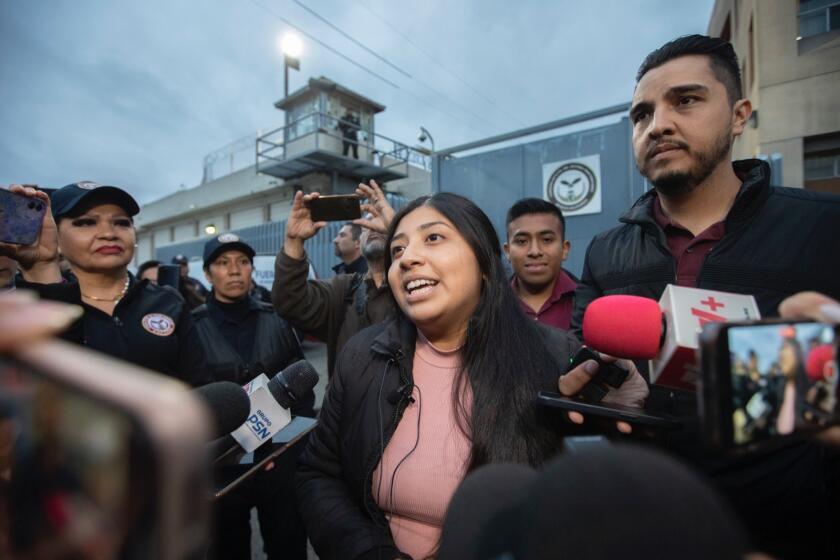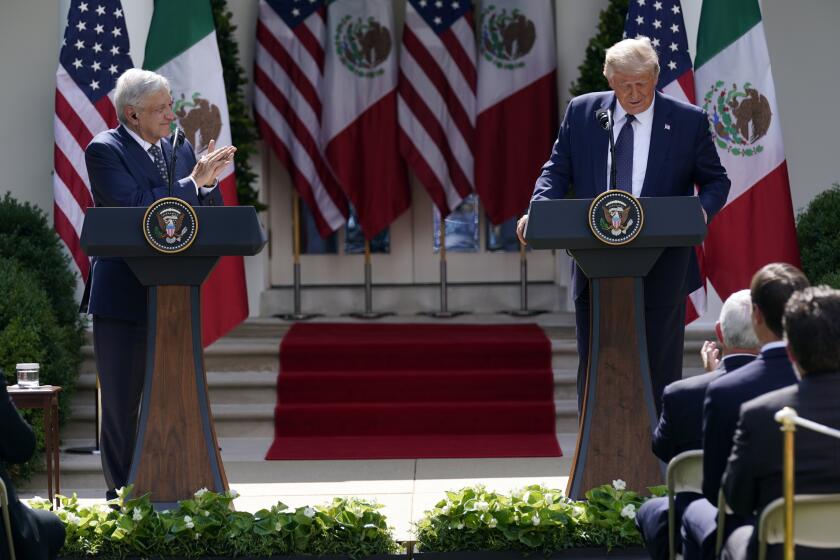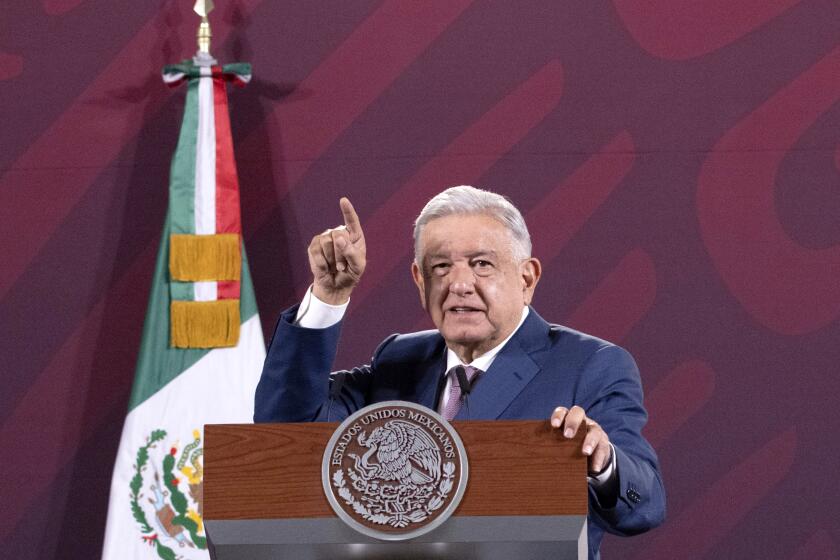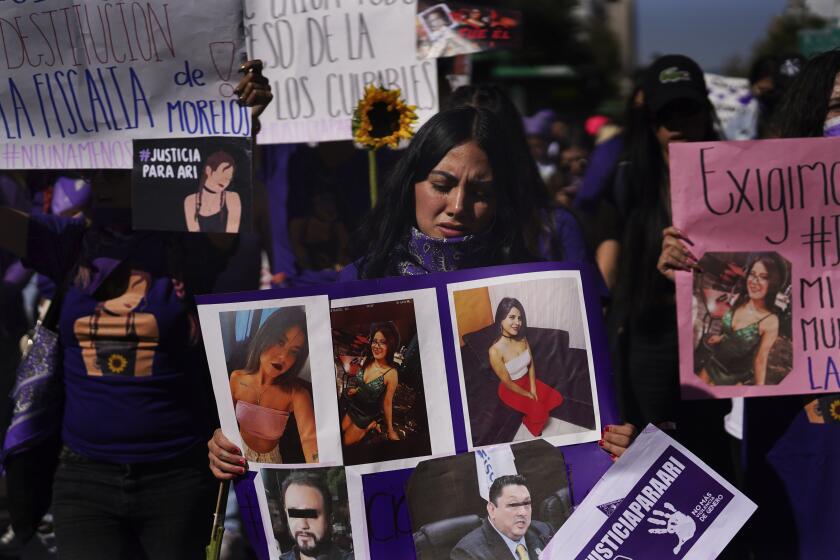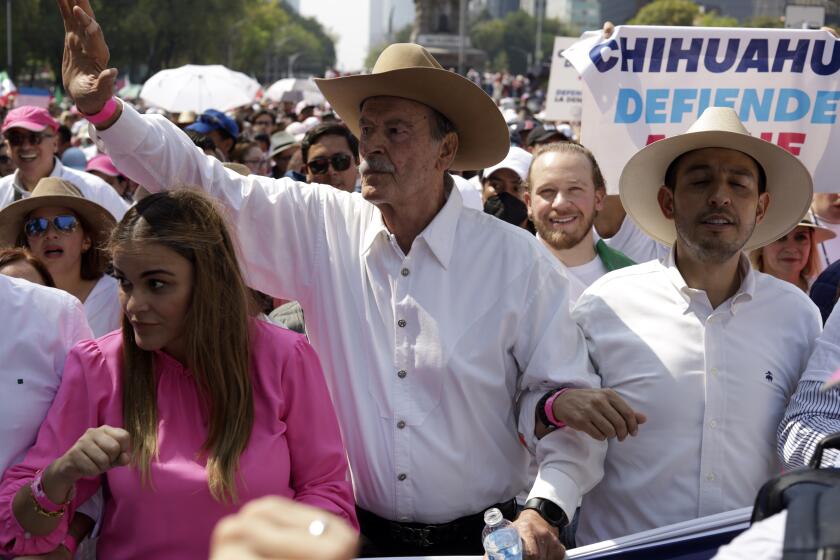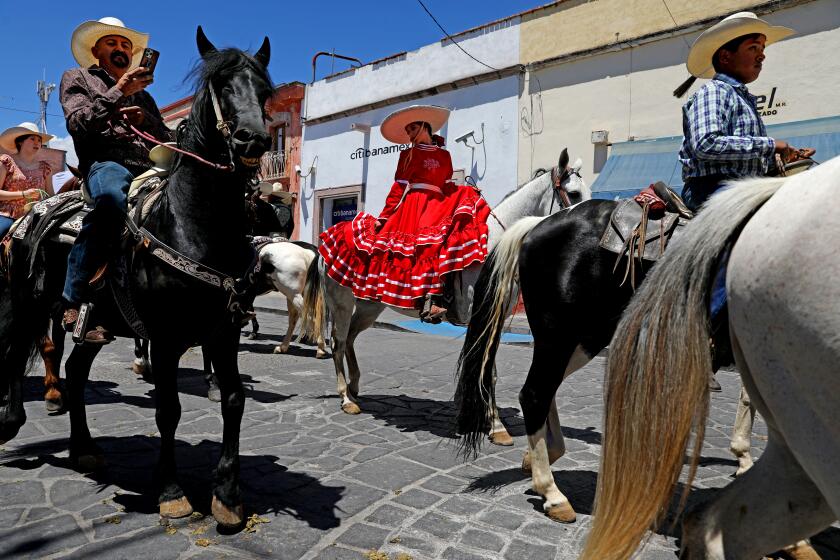‘I have enough ovaries to apply the law.’ The language of gender enters the Mexican presidential race
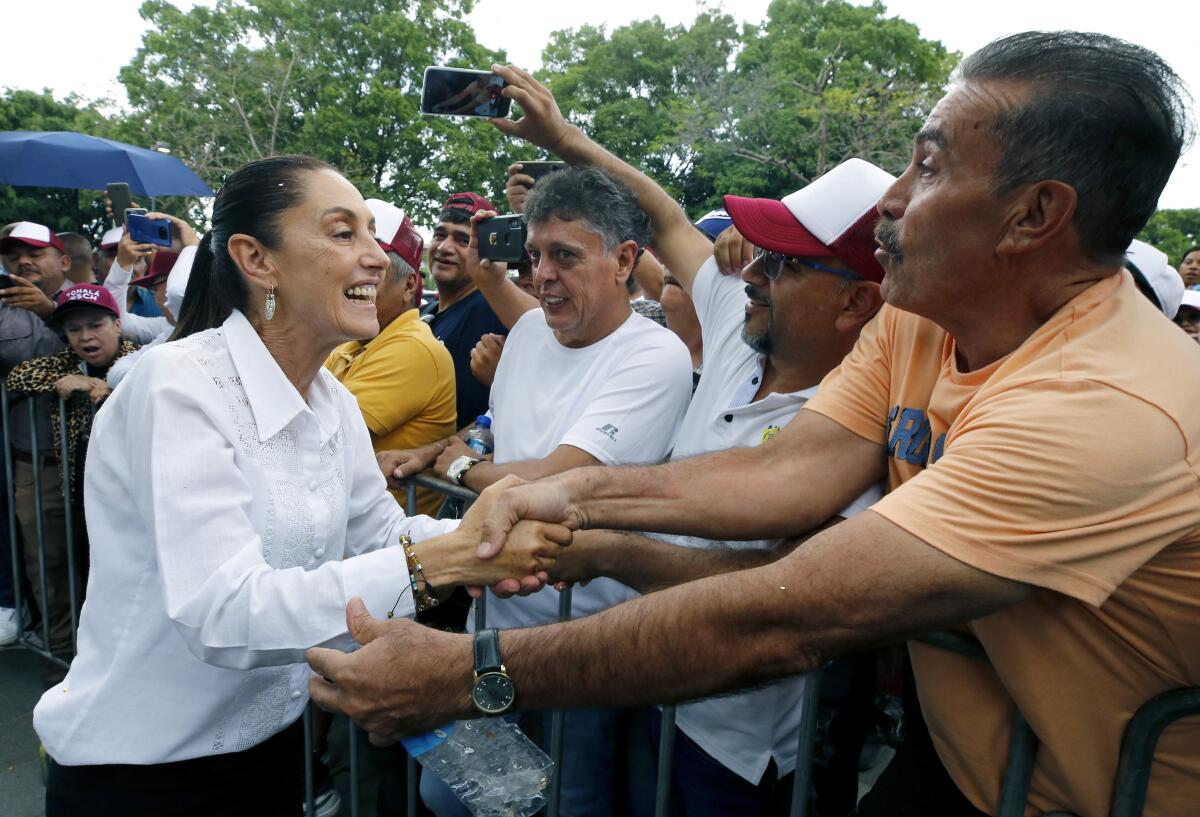
MEXICO CITY — The two presidential front-runners grew up exposed to sharply different visions of what a woman in Mexico could aspire to be.
In her impoverished home in the state of Hidalgo, Xóchitl Gálvez faced beatings from her alcoholic father, who once threatened to kill her mother. She’d hear the men in her family quip, “Women are only good for the petate (a bed) and the metate (a stone to grind grains).”
Claudia Sheinbaum grew up hearing her parents, both scientists and former student activists, talk politics in their home in the state of Mexico. She saw firsthand what a woman could accomplish, spending a night at age 15 at a hunger strike with Rosario Ibarra de Piedra, the pioneering crusader for the disappeared whose work helped build Mexico’s human rights movement.
As the decades ticked by, both women rose in their careers — in academics or business, and then politics — as Mexico pushed to increase women’s participation in the political arena.
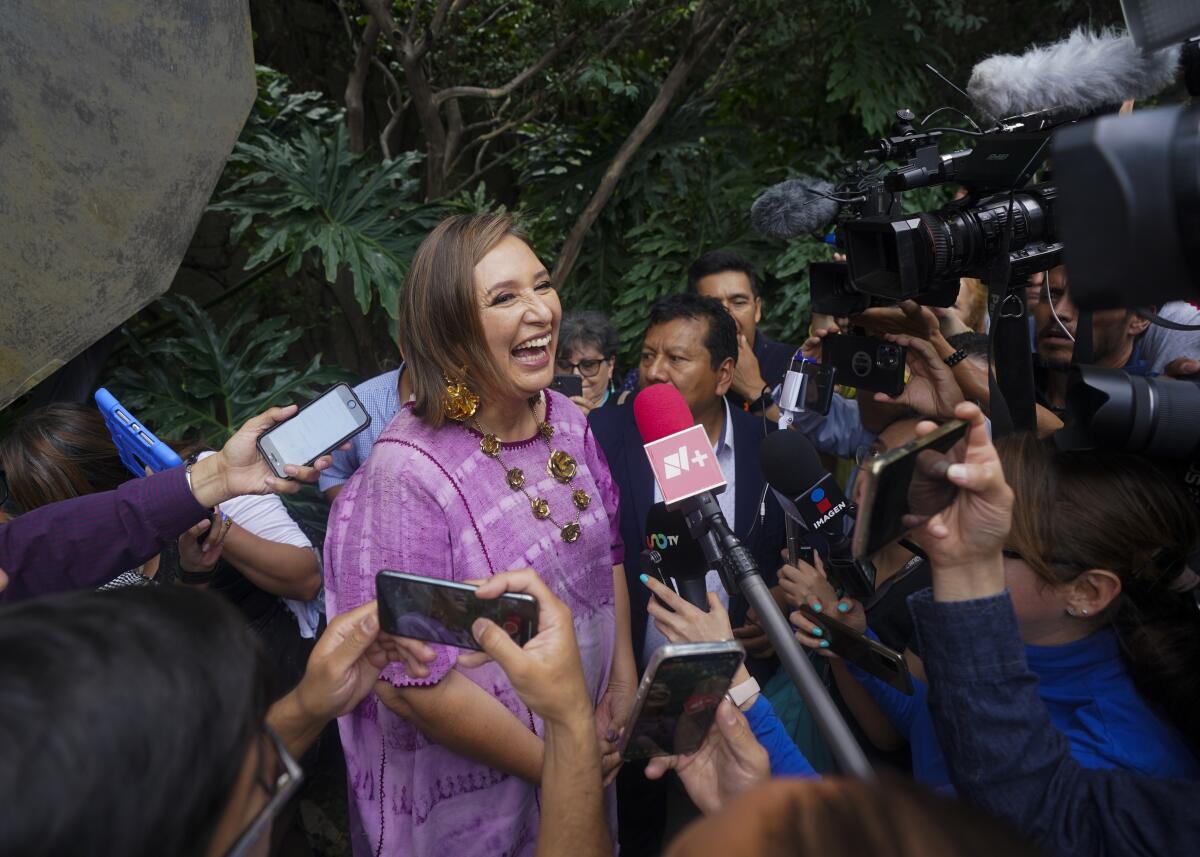
Now they’re fighting to become Mexico’s first woman president.
Gálvez, a senator, and Sheinbaum, the former mayor of Mexico City, are campaigning hard to get on the ballot in next year’s election. As Sheinbaum aims to represent the president’s party and Gálvez fights for an opposition coalition’s nomination, each is invoking her gender and the glass ceiling she would shatter.
“Mexico is no longer written with the M of machismo ... but M of mother, M of mujer” or woman, Sheinbaum declared to thousands of supporters just before leaving her post as mayor to enter the presidential race.
Mexico City Mayor Claudia Sheinbaum aims to succeed President Andrés Manuel López Obrador, and shares his policies, ideology and even speech patterns.
Gálvez has called Mexico’s president a “machista” and told reporters, “You need many ovaries like the ones I have to confront such a powerful man.”
But even with two women as front-runners, the election is less likely to turn on issues of gender, including rampant violence against women, than how voters feel about one man. The race is widely seen as a referendum on President Andrés Manuel López Obrador, whose Morena party controls a huge swath of the country.
“People vote for women without a problem. What matters is the political party, and you have to understand that Mexico is not a feminist country,” said Karolina Gilas, a political scientist at the National Autonomous University of Mexico, or UNAM. “Mexican society continues to be very conservative.”
While the presidential hopefuls can’t ignore feminist issues in a country where an average of 10 women a day were slain last year, the movement doesn’t have the weight to tip a national election either, Gilas said.
“Women make up a bit more of the electorate than men, and participate a bit more than men, but feminism in particular does not decide elections,” said Gilas.
In fact, said UNAM sociologist Georgina Cárdenas, “in this country, saying that you’re a feminist in certain spaces doesn’t generate sympathy.”
“People have the idea that being a feminist is being a radical person, of women burning bras and being against men. They don’t understand it as a social movement to fight for equality.”
A Tijuana police officer imprisoned for killing her cop boyfriend shows how Mexico — struggling with femicides — reacts when a woman kills her abuser.
Cárdenas has watched the antagonism between Gálvez and López Obrador but views Gálvez’s rhetoric as a way for her to gain recognition as an opposition figure.
Sheinbaum, Cárdenas said, has used less striking language when talking about women’s issues, probably in an attempt to avoid alienating voters for whom they are not a priority.
“She doesn’t need to commit herself to something radical,” Cárdenas said, “because she feels that in one way or another she’ll inherit the political capital of her leader, so she doesn’t need the risk.”
Gender quotas and growing parity
The fact that Mexico — where women didn’t have a constitutional right to vote until 1953 and which today struggles with femicides — could have a woman president might seem remarkable.
But political experts point to Latin American leaders such as Cristina Fernández de Kirchner in Argentina; Michelle Bachelet in Chile; Violeta Barrios de Chamorro in Nicaragua; and most recently, Xiomara Castro in Honduras. And they note the gender parity laws across the region that led to more women entering politics.
In the 1990s, Mexico began passing reforms to open up the political sector to women — first with a recommendation for political parties to post female candidates, followed by obligatory gender quotas.
In 2018, women won nearly half the seats in both houses of Mexico’s Congress, and the next year both chambers overwhelmingly passed a constitutional reform requiring parity in the executive, legislative and judicial branches of government.
Today, a woman heads the Supreme Court. Women hold eight of Mexico’s 31 state governorships and, in 2022, accounted for 25% of the country’s mayors.
In 2020, Mexico criminalized political violence against women, which includes restricting voting rights, threats aimed at ending a campaign and distributing political propaganda with gender stereotypes.
The next year, the country’s top electoral tribunal annulled an election after billboards and graffiti aimed at a mayoral candidate in Guerrero state blared messages such as “It’s time for men” and “Not one more old woman in power.”
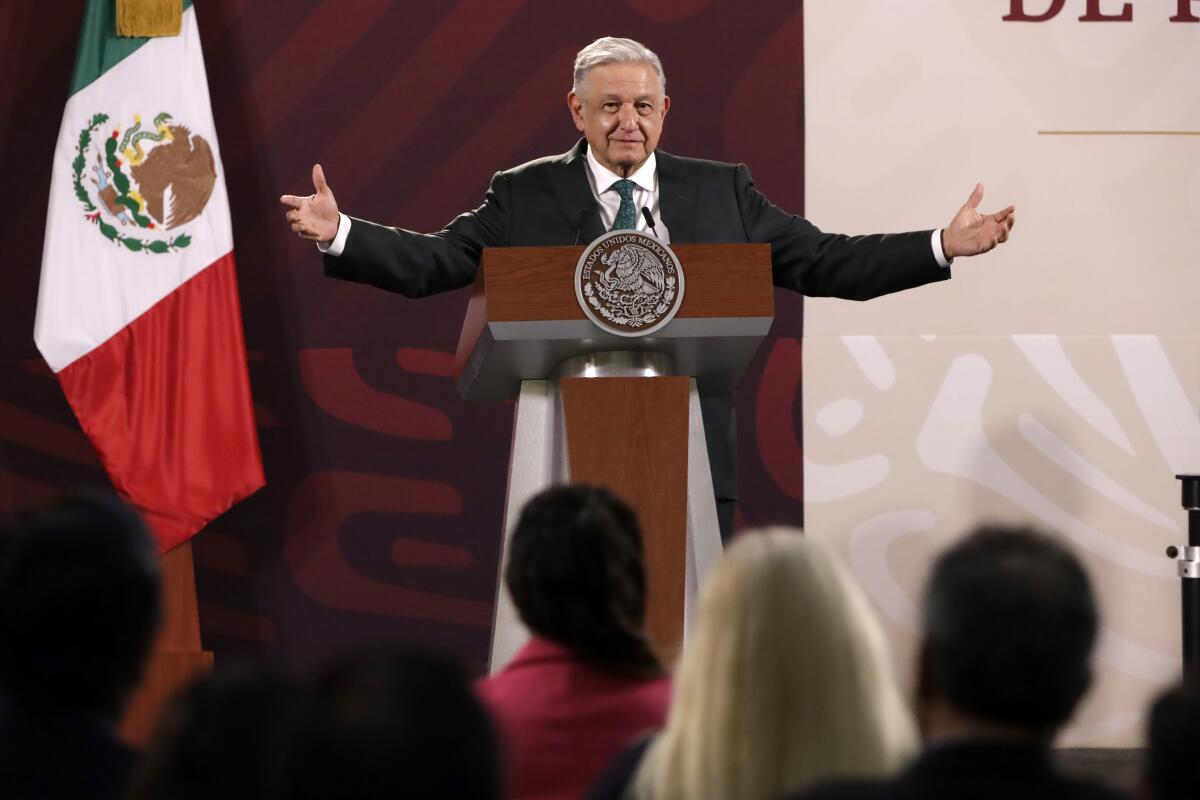
As the presidential campaigns have ramped up, Gálvez has accused López Obrador of political violence in his frequent disparagement of her, including saying she was a puppet chosen by powerful men.
After the top electoral court said some of the president’s expressions could be considered gender-based violence, López Obrador questioned whether he wasn’t a victim too: “Everything that they say to me, isn’t that gender violence?”
For Mexican President Andrés Manuel López Obrador, appearing to stand up to the United States has proved to have political benefits at home.
‘You’re a woman’
Sheinbaum and Gálvez have campaigned most heavily on whether they would continue or reverse the policies of the popular leftist president — a populist who expanded social welfare programs but has been criticized for his attempts to weaken institutions seen as checks and balances on government power, including the National Electoral Institute.
Mexico’s transparency institute, which has played a pivotal role in exposing corruption, is fighting President López Obrador to do its job.
But the candidates have also sought to harness support by talking about their gender.
“They told me, ‘You’re a woman, you’re not going to be able to handle the security of the city,” Sheinbaum, 61, recounted at a campaign event in Mexico City before saying that under her watch the city’s homicides have diminished significantly.
When she was mayor, Sheinbaum spoke often about her initiatives for women, including centers where victims of violence could get legal and psychological support, an emergency hotline for women to report violence, more street lighting and cameras and a DNA bank to help solve sex crimes.
She’s touted her work in battling violence against women, pointing to a reduction in the violent deaths of girls and women and an increase in judges approving charges against femicide suspects. And she made headlines last year when she accused the attorney general of the neighboring state of Morelos of covering up the killing of 27-year-old Ariadna López. That official was recently taken into custody by Mexico City prosecutors.
Mexico City arrests Uriel Carmona, Morelos state’s chief prosecutor, charging him with obstructing the investigation into Ariadna López’s death.
But Sheinbaum, whose campaign did not respond to multiple requests for an interview, has had a tense relationship with feminist activists over her reactions when they occupied public spaces.
In September 2020, when women in black hoods stormed the National Human Rights Commission in downtown Mexico City and evicted government workers — declaring the building a shelter for female victims of violence — Sheinbaum called the takeover violent and said that she didn’t understand its purpose because the government had been doing its job.
She later she clashed with feminists who installed protest art on a pedestal where a Columbus statue once stood on a busy roundabout. The purple silhouette of a girl with her fist raised was meant to draw attention to victims of femicides and abuse and to serve as a meeting point for protests.
The gruesome killing of Ariadna López shocked Mexico, spurred protests in the capital and highlighted the nation’s epidemic of violence against women.
When the mayor announced she would replace the monument with a replica of a pre-hispanic sculpture of a young Indigenous woman, and the feminists protested, Sheinbaum called them “profoundly racist and classist.” The city ultimately agreed to allow the feminists’ monument to remain.
Sheinbaum “should have been more careful” in how she’s approached feminists, said Lorena Villavicencio, a former federal congresswoman who helped form a group to back Sheinbaum’s campaign and promote gender equality. But as mayor, she said, Sheinbaum was stuck between safeguarding property rights and freedom of expression.
‘Señora Xingona’
Gálvez, 60, who holds progressive views although she represents a conservative party, shot to fame in recent months after the president began talking about her, saying she represented the “mafia of power.”
The National Electoral Institute ruled he had to stop, so during a segment of the president’s daily morning news conferences called “Who’s Who in the Lies of the Week,” in which he accuses reporters of “fake news,” López Obrador said he wouldn’t mention Gálvez’s name and a spokesperson dubbed her “Señora X.”
“I’m the Señora Xingona, with an X. I like it,” Gálvez told a local newspaper, a play on the word chingona, slang for “badass woman.”
At a campaign event where she called the president soft on security, she told attendees “you need ovaries to combat crime, and I have enough ovaries to apply the law.”
Gálvez, of Indigenous descent, said in an interview with The Times that her career has been focused more on the Indigenous than women’s issues. But she pointed to several initiatives she’s led, including a foundation to improve nutrition for children and pregnant women, as well as centers for Indigenous women to learn about sexual health and get legal help in cases of violence, when she was former President Vicente Fox’s top Indigenous affairs official in the 2000s. As senator, she fought to pass a law to give social security to domestic workers.
Online outbursts by Vicente Fox have made the former Mexican president campaign kryptonite for his favored candidate in the next election.
She called for better follow-up to domestic abuse complaints and said prosecutors’ offices should employ psychologists for victims. She said she wouldn’t make the same mistakes as Sheinbaum when approaching feminist protests over gender violence because of her own experience escaping a sexual assault as a university student.
“I think I would have the capacity to put myself in the shoes of these women,” she said. “I would be empathetic in understanding the meaning of the protests and not generalizing that all women who take to the streets intend to be violent.”
‘It’s not enough to name yourself a feminist’
Prominent Mexican feminists say neither candidate has shown enough commitment to changing women’s lives.
“We’re a bit tired that people name themselves feminists and think that with that they have our vote,” said Arussi Unda, founder of Las Brujas del Mar, which helped organize a national women’s one-day strike in 2020. She said that having a woman as president is important — but one with a clear feminist agenda is more so.
“Of course parity is important, representation of women in all spaces is important — but which women?” Unda asked. “I think that should always be the question.”
Renata Villarreal, co-founder of the feminist group the Green Tide, said that although she agreed with Gálvez’s assessment of the president as a machista, her rhetoric “could be strategy.” When asked if Sheinbaum was a feminist, her answer was clear: “Of course not.”
“A feminist woman who supports victims and knows what women experience will never be against that someone who scratches a wall, breaks a monument or closes a street,” Villarreal said. “We know that when you get to that place, it’s because you already exhausted all the other options. It’s when you’re fed up and angry.”
Esperanza Palma, a sociologist at the Metropolitan Autonomous University in Mexico City, said that the front-runners won’t benefit from emphasizing gender issues too much. “They can’t only focus on a feminist agenda. Mexico has problems of violence and organized crime. ... They have to present a strategy.”
As crime engulfs many Mexican states, immigrants who’ve saved to retire there are reevaluating ties to home — and whether returning is worth the risk.
However, she was hopeful that having two front-runners speak about women’s issues helps show that “it’s important to be done with a machista Mexico.”
Gilas, the political scientist, said that it’s natural that both women would present themselves as feminists but that the polarization between the president’s party and the opposition is “so strong that all other considerations are secondary. The election of 2024 is, do you want to continue with the López Obrador camp or do you want another?”
“Gender will not be what determines the electoral result, it’ll be people’s posture towards this government,” she said.
That was clear at a recent rally for Sheinbaum in a lower-income borough of Mexico City. As several hundred people waited in pouring rain for Sheinbaum to speak outside a cable car station her administration built, residents said they supported her because of government stipends for students to buy school supplies and meals and low cost public transportation. But most of all, for her loyalty to López Obrador, who has won support with his cash assistance to farmworkers, the elderly and people with disabilities.
Data compiled by a medical examiner in northern Mexico reveal that fentanyl use is far more common there than the country’s leaders have claimed.
“No one had supported us like him, no one had cared about the poor,” said Maria Hernández, 58, who attended with her husband and neighbors. “She has to follow his same projects, that’s why we’re putting our trust in Claudia.”
Hernández said it was poor taste of Gálvez to share her story of poverty “to win over the people” and doubted that she had risen honestly from selling jello cups with her mom as a child in Hidalgo to founding her own company. She’s been angered by Gálvez’s feud with López Obrador.
“We talk among ourselves and say, ‘What’s the matter with her, why is she telling off our president?’”
Special correspondent Cecilia Sánchez in The Times’ Mexico City bureau contributed to this report.
More to Read
Sign up for Essential California
The most important California stories and recommendations in your inbox every morning.
You may occasionally receive promotional content from the Los Angeles Times.

